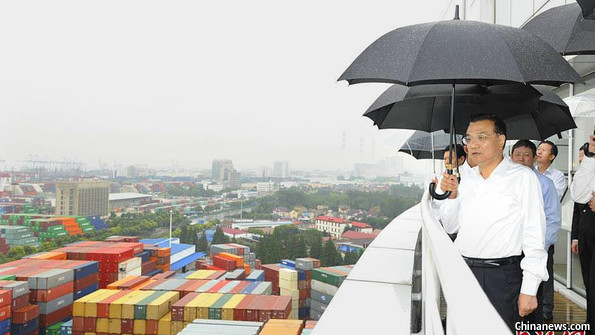Shanghai’s Free Trade Zone
Li who will not be obeyed
The Shanghai Free Trade Zone’s frustrating first year
 Reforms don’t stack up
Reforms don’t stack upLI KEQIANG, China’s prime minister, often promises bold financial reforms. He once reportedly declared that his administration would slash bureaucracy with the zeal of a brave man cutting his own wrist. His decision to make the Shanghai Free Trade Zone, a special economic area on the outskirts of the port city, a shining example of market reform is thus a test of his mettle.
So, a year after the zone’s launch, how is the bold experiment going? China Daily, an official newspaper, marked the anniversary by trumpeting that the zone had reached a “record-breaking milestone”. It declared that more than 12,000 firms had registered in the 29-square-kilometre (11-square-mile) area, and that foreign firms were flooding in.
Advertisement
Officials stress the zone’s innovations. As a step towards opening China’s gold market, it recently launched an international gold exchange. Trading in other commodities, such as crude oil, is also promised. Rather than requiring firms to get explicit permission to operate, businesses in the zone are free to set up shop as long as their industry is not included on a “negative list”. Vivian Jiang of Deloitte, a consultancy, says the zone has made small but helpful improvements in customs clearance, logistics and in the bureaucracy of setting up new businesses. Some useful reforms have been made in the settling of disputes between companies.Chen Bo of the Shanghai University of Finance and Economics, who advises the government on the zone, acknowledges that the pace of reform has been slow. But he argues that financial reforms that have proved too hard or risky on a national scale can nevertheless be pushed through more quickly in the zone.
So all’s well, then? Not quite. Some experts maintain that the project cannot work, even in principle. Mr Li has stressed the importance of financial liberalisation in the zone. But a noisy chorus, including influential figures at the central bank, believe it is unworkable to experiment with bold financial reforms in one area without seeing them spill over dangerously to the rest of the country. Others point out that by insisting that all reforms are replicable elsewhere in China, the government may have inadvertently biased the experiment towards caution.
The zone is widely seen by businesses as a disappointment. Some local firms are setting up there only because they have been strongly encouraged to do so by officials. Foreign firms going in are hoping for a first-mover advantage—but such an edge has yet to materialise, whispers one manager. (Only 5% of firms registered in the zone have headquarters outside greater China.) Steps taken thus far on financial liberalisation have fallen far short of the promised freeing of the currency and of interest rates. One manager at a foreign bank says nothing much is different at his branch in the zone.
Even Mr Li has let it be known that he is unhappy with the zone’s progress. When he paid a visit last month (see picture) he grumbled that reforms were moving too slowly. Perhaps for that reason, the local official ostensibly in charge of the area was pushed out of his job on the eve of Mr Li’s arrival. Mr Li echoed complaints that the negative list is much too long. Even after a trim in July, it still restricts activities in 139 industries.
It is hardly encouraging that Mr Li, the most senior economic figure in China’s most powerful central administration in decades, cannot get his own bureaucracy to implement promised reforms with gusto. Turf battles among powerful regulators, such as the central bank and the banking supervisor, are one drag. Another is the ongoing crackdown on official corruption, which has made administrators reluctant to pursue bold policies that may later attract unwanted scrutiny.
On his visit, a frustrated Mr Li thundered that “companies should not be allowed to lose at the starting line due to excessive government regulations.” Quite so, but can he persuade mandarins to act?

No comments:
Post a Comment